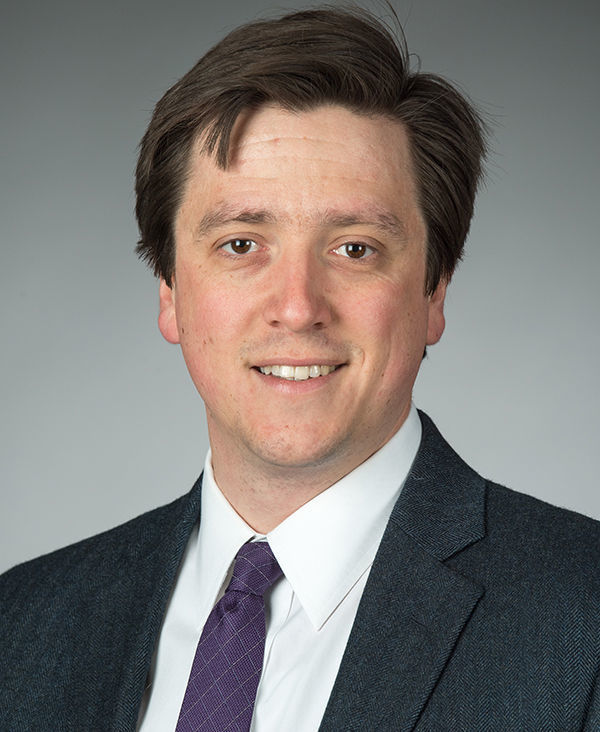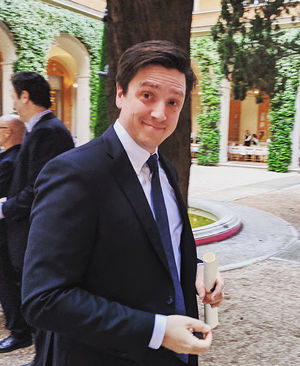Program of Liberal Studies professor and Medieval Institute Faculty Fellow wins fellowship to research at center for Italian Renaissance studies in Florence

Denis Robichaud, an associate professor in the Program of Liberal Studies, has been awarded the I Tatti Jean-François Malle Residential Fellowship for his project, Controversies over God and Being in the Italian Renaissance: religion, philosophy, and Giovanni Pico della Mirandola’s De ente et uno.
As one of 15 recipients awarded an I Tatti residential fellowship, Robichaud will spend a year researching and writing at I Tatti, the Harvard University Center for Italian Renaissance Studies in Florence, Italy.
“Being a part of this scholarly community is a tremendous gift and opportunity for me,” Robichaud said. “I Tatti offers expert researchers from a wide range of disciplines a venue to form a community, as well as the time and resources to conduct new research.”
Robichaud, a faculty fellow in the Medieval Institute, the Nanovic Institute for European Studies, the Center for Italian Studies, the History of Philosophy Forum, and the Workshop on Ancient Philosophy, is particularly looking forward to having access to the center’s Berenson Library, which offers resources on the “long” Renaissance, from 1200 to 1650, and houses over 200,000 volumes, numerous periodicals, rare books and special collections, and a microfilm collection of tens of thousands of manuscripts and early books.
“The I Tatti Villa —which includes a research center, library, art collection, and residences for fellows — sits on serene grounds with lush gardens and farms,” he said. “It offers both tranquility from the busy center of Florence and proximity to Italy’s countless manuscript and rare book collections, all of which make it incomparable for research on the Renaissance.”
Controversies over God and Being in the Italian Renaissance is a book and translation project on Giovanni Pico della Mirandola’s De ente et uno, or On Being and the One.
It will examine how Pico, one of the best-known philosophers of the Renaissance, worked on ancient Neoplatonism and medieval ontologies in order to answer traditional questions from Medieval metaphysics with new Greek texts. Robichaud also seeks to explain how Pico, playing the role of a scholasticus, understood Dominican theology.
“Pico’s debates with friends over the nature of God and reality at a Medici villa quickly spread like storms not just over Christianity, but also Judaism, Islam, paganism, and religion per se,” Robichaud said. “Many intervened, including university professors and poets, Dominicans in Florence, the philologist Angelo Poliziano, Pico’s polymath nephew Gianfrancesco Pico, the expert of Arabic and Jewish philosophy Elia del Medigo, and Marsilio Ficino — whose Platonism Giovanni Pico first targeted.
“At its core, the project asks whether Medieval and Renaissance philosophy of religion was possible outside of a theological framework, which is a key question for understanding how the history of philosophy developed into its present state.”
“At its core, the project asks whether Medieval and Renaissance philosophy of religion was possible outside of a theological framework, which is a key question for understanding how the history of philosophy developed into its present state.”

As part of the project, Robichuad will translate into English all of the major texts involved in the controversies surrounding the De ente et uno for the first time, including works by Giovanni Pico, Cittadini, Gianfrancesco Pico, and del Medigo.
Robichaud, who won the W. G. Gordan National Endowment for the Humanities Rome Prize Fellowship from the American Academy in Rome in 2018, said that the support he receives from Notre Dame and from his colleagues across the University has laid the groundwork for his success.
“Notre Dame has a wonderful group of scholars working on the history of philosophy in the Department of Philosophy and the Program of Liberal Studies, the Medieval Institute, the Workshop on Ancient Philosophy, and the History of Philosophy Forum,” he said. “My project, which is already very advanced, grew out of a graduate seminar I offered in the Medieval Institute in 2018 on Neoplatonic Controversies, in which we read Pico’s De ente et uno in Latin, and discussed his ancient and medieval sources.”
In the wake of the coronavirus pandemic, Harvard University reopened the I Tatti Center for the fellows in May. The Berenson Library has also digitized and made available online more than 20,000 new volumes since mid-March. Fellows will have access to weekly seminars, informal online drop-in sessions, and electronic resources — including scan and delivery services.
“Harvard plans to bring all of the residential fellows to I Tatti in fall 2020, but if circumstances do not allow fellows to travel or conduct research on site, it is sure to have an impact on my research,” Robichaud said. “Nonetheless, even in the worst-case scenario, the fellowship will still offer precious time and space to think and write, as well as the opportunity to connect with a community of scholars and a wealth of resources online.”
Originally published by at al.nd.edu on July 16, 2020. Republished at medieval.nd.edu on September 1, 2021.